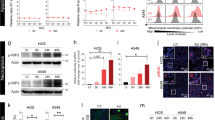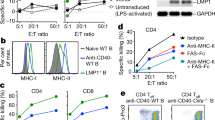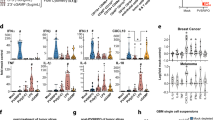Abstract
Viral oncolysates of Newcastle disease virus (NDV) have been widely used for the treatment of malignant melanoma. Apparently, this nononcogenic and apathogenic paramyxovirus can alter the immunogenicity of tumor cells. To determine the influence of NDV infection on a tumor-specific T-cell response on a functional level, we used autologous primary melanoma cells infected with the NDV-strain Ulster. Therefore, melanoma cells and tumor-infiltrating lymphocytes were prepared from a freshly resected tumor, and tumor-infiltrating lymphocytes were subjected to limited dilution cloning. Proliferation assays of the T-helper cell clone sTS3 (CD4+) showed that the T-cell clone was rendered nonreactive against its autologous major histocompatibility complex II+, B7-1/B7-2− melanoma SMS, even remaining unresponsive to subsequent stimulation by interleukin-2. NDV infection of the SMS melanoma cell line not only completely restored the proliferative response of sTS3 to SMS, comparable with stimulation by cross-linking of anti-CD3/anti-CD28 monoclonal antibodies, but also inhibited the induction of anergy. Electrophoretic mobility shift assays of sTS3 cell lysates revealed the induction of the CD28-responsive complex by coincubation with NDV-infected melanoma cells. Because the induction of this complex of nuclear proteins shows specificity for the activation of the CD28 pathway but functional B7-1/B7-2 expression was not detectable on SMS melanoma cells at any timepoint, we propose the induction of a costimulatory factor different from B7 by NDV viral proteins.
This is a preview of subscription content, access via your institution
Access options
Subscribe to this journal
Receive 12 print issues and online access
$259.00 per year
only $21.58 per issue
Buy this article
- Purchase on Springer Link
- Instant access to full article PDF
Prices may be subject to local taxes which are calculated during checkout
Similar content being viewed by others
Author information
Authors and Affiliations
Rights and permissions
About this article
Cite this article
Termeer, C., Schirrmacher, V., Bröcker, EB. et al. Newcastle disease virus infection induces B7-1/B7-2-independent T-cell costimulatory activity in human melanoma cells. Cancer Gene Ther 7, 316–323 (2000). https://doi.org/10.1038/sj.cgt.7700109
Received:
Accepted:
Published:
Issue Date:
DOI: https://doi.org/10.1038/sj.cgt.7700109
Keywords
This article is cited by
-
Induction of antitumor response to fibrosarcoma by Newcastle disease virus-infected tumor vaccine
Medical Oncology (2017)
-
Durchbrechen von Therapieresistenzen
Wiener klinisches Magazin (2015)
-
Efficiency of adjuvant active specific immunization with Newcastle disease virus modified tumor cells in colorectal cancer patients following resection of liver metastases: results of a prospective randomized trial
Cancer Immunology, Immunotherapy (2009)
-
Head and neck cancer immunotherapy: Clinical evaluation
Current Oncology Reports (2008)
-
Reovirus and other oncolytic viruses for the targeted treatment of cancer
Targeted Oncology (2006)



